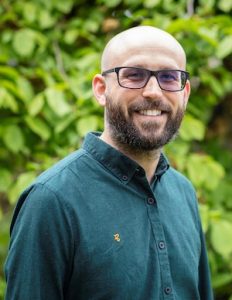Meet the Trainer – Toby Hodges

Today we meet Toby Hodges from EMBL Heidelberg, who is an organiser and trainer at the upcoming EMBL Course: Computing Skills for Reproducible Research: Software Carpentry (16 – 18 October 2019). At EMBL, Toby supports EMBL’s bioinformaticians, providing training, advice, community building events and resources for computational science.
What is the greatest benefit of the course for the scientific community?
Computational research skills have never been in greater demand, particularly in the biological sciences. To meet this demand, many researchers must learn programming, command line computing, and other techniques required for data analysis. This Software Carpentry course provides a solid foundation for these skills, teaching researchers good practices in software and analysis pipeline development. The skills and experience that researchers gain by participating in the course will promote high-quality, efficient, and reproducible computational science.
What could the techniques in this course be used for in the bigger picture?
Almost anything! Command line computing, programming, and the other skills taught in the course are becoming vital in most areas of biology but are also widely applicable in a lot of other sectors and career paths – web design, journalism, politics, you name it! Of course, we hope that every researcher who attends our workshops will go on to a long and wildly successful research career but, should they choose to go in a different direction, we’re sure that the skills taught here will still prove beneficial.
Are the methods used in this course unusual or new?
New? Certainly not – most of the tools and techniques taught in our course have existed for many years already. What’s unusual, though, is for biologists and bioinformaticians to have the understanding of good practices in software development and workflow management that the workshop provides. Unfortunately, there’s still a lot of poorly-documented and poorly-written scientific software out there. Once they’ve attended our workshop, researchers will be better able to ensure that the programs and pipelines that they create are reproducible and reusable.
In comparison to other training environments, what do you enjoy most about teaching at EMBL?
It’s helpful for us to teach in a relatively informal environment. We find that, when course participants are relaxed, it creates a positive environment in which they can learn. We’re also privileged to have access to such great teaching facilities and to have excellent support from our colleagues in EMBL’s Course and Conference Office, who make it very easy for us to teach these courses.
What is your number one tip related to the course?
Make the most of it, both as an opportunity to learn from the trainers and as a chance to develop your network. The coffee and lunch breaks are a great chance to get to know your fellow course-mates, to share ideas and experiences, and to learn more about everyone else’s journey to this point.
What challenges is your research field facing?
It’s becoming increasingly important to think about how we manage our research data. The volume of data produced in a typical experiment has become enormous in recent years and we’re scrambling to catch up. It’s vital that our research data is well-annotated and retrievable so that others can re-use it and reproduce our results in the future, but ensuring this can be challenging. The other major challenge to my work is the sheer volume of different research techniques, tools, and data formats being used in modern biology. Bioinformatics has such a diverse ecosystem of tools and file formats, which is developing at a breathtaking pace. It can be difficult to stay up-to-date.
Where is science heading in your opinion?
The future of biological research will increasingly involve the integration of many different types and formats of data into a single experiment or study. We already see this in multi-omics studies and the increasing combination of imaging and single-cell sequencing techniques and I expect the trend to continue towards these integrated approaches.
What was your first ever job?
Stacking shelves in a supermarket.
If you were a superhero what power would you have?
If I could choose: the ability to never make a typo. If I don’t get to choose then, sadly, it would probably be deafeningly loud voice.
What is your bucket list for the next 12 months?
After a very hectic few years, my main target for 2019 is to get better at saying “no” to things.
What is your favourite recipe?
Michael Chu’s Classic Tiramisu: http://www.cookingforengineers.com/recipe/60/The-Classic-Tiramisu-original-recipe